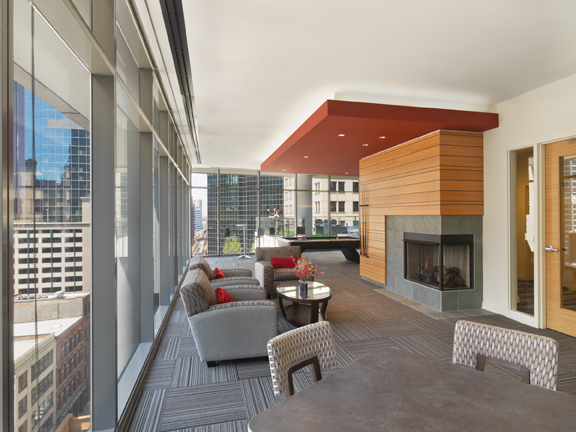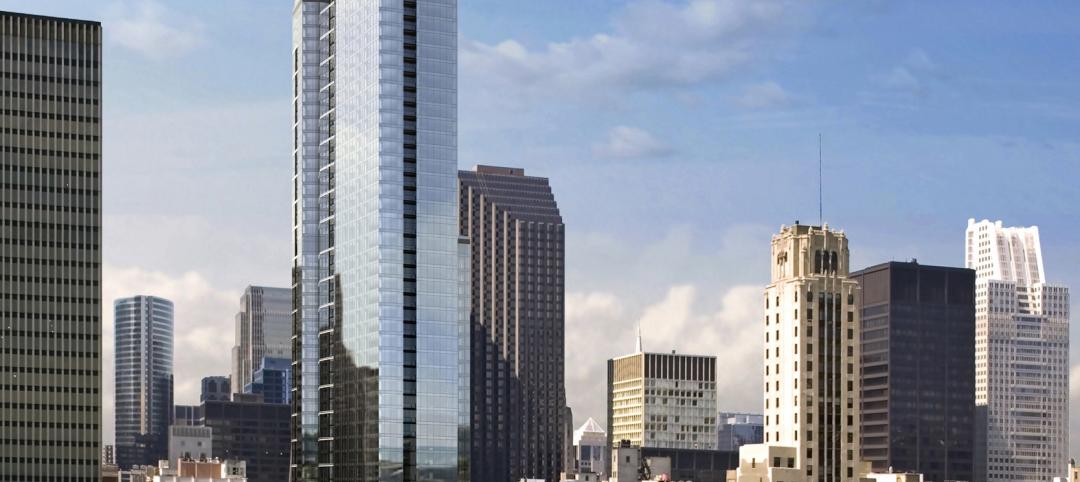Except for a few pockets of ultra-luxury condo action—New York, San Francisco, and parts of Florida, Hawaii, and metro Washington, D.C.—today’s multifamily story is all about rentals. “The apartment sector has been a darling for investors over the past two years,” notes the Urban Land Institute in its recent Real Estate Consensus Forecast. Vacancy rates are at an enticing 5.0%, and rental rates should be up 5.0% this year, although ULI does forecast some slippage next year, to 4.0%.
“Investors continue to view apartments as a preferred asset class in today’s environment,” says Dale Connor, Lend Lease’s Managing Director, Project Management & Construction, Americas. He sees developers playing catch-up to meet the growing demand for apartments, especially in the top five rental markets: New York City, Washington, D.C., Boston, Chicago, and Los Angeles.
SCROLL DOWN FOR GIANTS 300 MULTIFAMILY FIRM RANKINGS
Savvy market-rate developers are looking for locations around universities, innovation incubators, and teaching hospitals, says Ray Kimsey, AIA, LEED AP, President of Atlanta-based Niles Bolton Associates. Land that was once set aside for retail or office development is being looked at for multifamily, especially if served by urban transit.
“If you look at the hottest neighborhoods around Washington, D.C., Pittsburgh, or Baltimore, they all have an influx of Gen-Y people graduating and wanting to stay in that environment,” he says. Kimsey says there’s even a movement toward walk-up, garden-style apartments in some suburbs and second- and third-tier cities.
The use of urban infill sites is adding to the popularity of podium-style multifamily construction, says Mathew Dougherty, PE, Vice President with McShane Construction, Rosemont, Ill. “The podium ‘stacks’ uses vertically within the existing floor plate, thereby allowing a mixed format of ground-floor retail, parking floors, and residential floor plates,” he says.
According to John Lahey, AIA, Managing Principal at Chicago-based Solomon Cordwell Buenz Associates, the rental market is being shaped by two factors: service and community.
“Service” refers to the heightened demand for amenities: party rooms, surround-sound movie theaters, fully equipped fitness centers, mega-size video screens in common areas, computer golf games that let you play any course in the world, I-GO car rentals—even “restaurant days,” where a local restaurant comes in and sells takeout dinners one night a week.
There are even amenities for canine occupants. “People love their dogs,” says Lahey, so dog walks, dog parks, dog washing bays, and dog walking and grooming services are becoming de rigueur in many large (>400 units) complexes. “People want their lives to be easier,” he says. “They want to be taken care of.”
Tenants are demanding more green amenities, says Kimsey. “Expectations about energy conservation and sustainable features are now viewed as a basic right by many tenants,” he says. “If they lived in a LEED-certified residence hall in college they want a LEED apartment”—but not if it costs more than market rate.
“Community” refers to the renter’s need for connection, says Lahey. In past decades, apartment dwellers put a premium on privacy. Less so today. “A lot of people who move back into the city, they’re not confirmed urban dwellers, and they want to meet people,” he says. “The Starbucks in your building becomes the meeting place to get integrated into the larger community.” McShane’s Dougherty says wifi connectivity has become a given in new and renovated rental projects.
“The design must be hot,” says Kimsey. The units themselves may be “smaller, tighter,” but that means they must be more elegant and efficient, with open layouts and near-condo-like finishes. McShane’s Dougherty says granite countertops, stainless steel appliances, upgraded bathrooms, and high-quality flooring are expected, even in suburban garden apartments. Developers are increasingly concerned about sound attenuation, he says, so insulation choices, assembly details, and materials selection are crucial.
Looking ahead, SCB’s Lahey says that, unlike the condo market, apartment development needs to be left to the pros—firms like AMLI, Avalon Bay, Equity Residential, Forest City, The Habitat Company. “They have the track record, and they really do know what they’re doing,” he says.
“The money is out there,” says Kimsey, but it’s split between smaller projects being funded by S&Ls and smaller banks, and big projects attracting institutional and private-equity investors. Holding back the pent-up demand: anemic job creation, which limits new household formation.
Even with low mortgage rates, many potential buyers have become skittish about purchasing a home, says Lend Lease’s Connor. SCB’s Lahey cites mobility as another factor in rental’s favor, especially with the younger generation.
“People will like living closer in, and units will get bigger, something decent in size, and they’ll be willing to pay for it,” he says. “They’ll see a home as a place in which to live, not necessarily as an investment.” +
TOP 25 MULTIFAMILY SECTOR ARCHITECTURE FIRMS
| Rank | Company | 2011 Multifamily Sector Revenue ($) |
| 1 | IBI Group | 38,489,114 |
| 2 | Niles Bolton Associates | 13,772,650 |
| 3 | Solomon Cordwell Buenz | 12,000,000 |
| 4 | RTKL Associates | 11,397,556 |
| 5 | WDG Architecture | 9,817,297 |
| 6 | Perkins Eastman | 9,100,000 |
| 7 | HOK | 8,715,422 |
| 8 | Perkins+Will | 7,193,120 |
| 9 | ZGF Architects | 6,225,112 |
| 10 | Cooper Carry | 5,708,482 |
| 11 | Kohn Pedersen Fox Associates | 5,280,000 |
| 12 | Ziegler Cooper Architects | 4,853,598 |
| 13 | Harley Ellis Devereaux | 4,800,000 |
| 14 | PGAL | 4,607,900 |
| 15 | OZ Architecture | 4,104,475 |
| 16 | GBBN Architects | 3,700,000 |
| 17 | Smallwood, Reynolds, Stewart, Stewart & Associates | 3,605,928 |
| 18 | VOA Associates | 3,367,000 |
| 19 | Carrier Johnson + CULTURE | 3,324,072 |
| 20 | Skidmore, Owings & Merrill | 3,074,000 |
| 21 | Gensler | 2,800,000 |
| 22 | Rule Joy Trammell + Rubio | 2,600,000 |
| 23 | FXFOWLE Architects | 2,399,900 |
| 24 | HKS | 2,398,926 |
| 25 | Mithun | 1,906,000 |
TOP 25 MULTIFAMILY SECTOR ENGINEERING FIRMS
| Rank | Company | 2011 Multifamily Sector Revenue ($) |
| 1 | STV | 119,671,000 |
| 2 | AECOM Technology Corp. | 36,000,000 |
| 3 | Parsons Brinckerhoff | 32,800,000 |
| 4 | URS Corp. | 28,500,000 |
| 5 | Michael Baker Jr., Inc. | 23,620,000 |
| 6 | WSP USA | 17,200,000 |
| 7 | Jacobs | 16,000,000 |
| 8 | Atkins North America | 15,368,901 |
| 9 | Wiss, Janney, Elstner Associates | 14,372,000 |
| 10 | KPFF Consulting Engineers | 12,000,000 |
| 11 | Simpson Gumpertz & Heger | 9,740,000 |
| 12 | Thornton Tomasetti | 7,610,000 |
| 13 | Stantec | 6,345,000 |
| 14 | Clark Nexsen | 5,308,534 |
| 15 | Arup | 4,600,161 |
| 16 | Coffman Engineers | 4,000,000 |
| 17 | Magnusson Klemencic Associates | 3,556,559 |
| 18 | Rolf Jensen & Associates | 2,600,000 |
| 19 | Aon Fire Protection Engineering | 2,250,000 |
| 20 | Smith Seckman Reid | 2,227,000 |
| 21 | Paulus, Sokolowski and Sartor | 1,800,000 |
| 22 | Science Applications International Corp. | 1,530,000 |
| 23 | Lilker Associates Consulting Engineers | 1,500,000 |
| 24 | French & Parrello Associates | 1,396,720 |
| 25 | AKF Group | 1,300,000 |
TOP 25 MULTIFAMILY SECTOR CONSTRUCTION FIRMS
| Rank | Company | 2011 Multifamily Sector Revenue ($) |
| 1 | Lend Lease | 734,160,150 |
| 2 | Clark Group | 612,803,196 |
| 3 | Balfour Beatty US | 441,602,518 |
| 4 | Walsh Group, The | 342,877,063 |
| 5 | Whiting-Turner Contracting Co., The | 283,477,065 |
| 6 | Turner Corp., The | 223,410,000 |
| 7 | Swinerton | 186,340,000 |
| 8 | Harkins Builders | 180,000,000 |
| 9 | McShane Co., The | 175,000,000 |
| 10 | Yates Co., The | 173,900,000 |
| 11 | PCL Construction Enterprises | 159,105,415 |
| 12 | Bernards | 144,000,000 |
| 13 | Paric Corp. | 138,000,000 |
| 14 | Hensel Phelps Construction Co. | 137,700,000 |
| 15 | Weis Builders | 131,960,000 |
| 16 | CORE Construction | 125,513,227 |
| 17 | Suffolk Construction | 111,885,268 |
| 18 | Power Construction | 106,000,000 |
| 19 | Weitz Company., The | 82,000,000 |
| 20 | Austin Industries | 77,074,905 |
| 21 | Brasfield & Gorrie | 67,682,938 |
| 22 | Absher Construction | 61,807,647 |
| 23 | James McHugh Construction | 54,624,665 |
| 24 | Bette Co., The | 54,000,000 |
| 25 | Choate Construction Co. | 51,875,781 |
Related Stories
| Mar 2, 2011
How skyscrapers can save the city
Besides making cities more affordable and architecturally interesting, tall buildings are greener than sprawl, and they foster social capital and creativity. Yet some urban planners and preservationists seem to have a misplaced fear of heights that yields damaging restrictions on how tall a building can be. From New York to Paris to Mumbai, there’s a powerful case for building up, not out.
| Mar 1, 2011
Smart cities: getting greener and making money doing it
The Global Green Cities of the 21st Century conference in San Francisco is filled with mayors, architects, academics, consultants, and financial types all struggling to understand the process of building smarter, greener cities on a scale that's practically unimaginable—and make money doing it.
| Mar 1, 2011
How to make rentals more attractive as the American dream evolves, adapts
Roger K. Lewis, architect and professor emeritus of architecture at the University of Maryland, writes in the Washington Post about the rising market demand for rental housing and how Building Teams can make these properties a desirable choice for consumer, not just an economically prudent and necessary one.
| Mar 1, 2011
New survey shows shifts in hospital construction projects
America’s hospitals and health systems are focusing more on renovation or expansion than new construction, according to a new survey conducted by Health Facilities Management magazine and the American Society for Healthcare Engineering (ASHE). In fact, renovation or expansion accounted for 73% of construction projects at hospitals responding to the survey.
| Mar 1, 2011
AIA selects 6 communities for long-term sustainability program
The American Institute of Architects today announced it has selected 6 communities throughout the country to receive technical assistance under the Sustainable Design Assessment Team (SDAT) program in 2011. The communities selected are Shelburne, Vt., Apple Valley, Mn., Pikes Peak Region, Co., Southwest DeKalb County, Ga., Bastrop, Tx., and Santa Rosa, Ca. The SDAT program represents a significant institutional investment by the AIA in public service work to assist communities in developing policy frameworks and long term sustainability plans.
| Feb 24, 2011
Perkins+Will designs 100 LEED Certified buildings
Perkins+Will announced the Leadership in Energy and Environmental Design (LEED) certification of its 100th sustainable building, marking a key milestone for the firm and for the sustainable design industry. The Vancouver-based Dockside Green Phase Two Balance project marks the firm’s 100th LEED certified building and is tied for the highest scoring LEED building worldwide with its sister project, Dockside Green Phase One.
| Feb 24, 2011
New reports chart path to net-zero-energy commercial buildings
Two new reports from the Zero Energy Commercial Buildings Consortium (CBC) on achieving net-zero-energy use in commercial buildings say that high levels of energy efficiency are the first, largest, and most important step on the way to net-zero.
| Feb 24, 2011
Lending revives stalled projects
An influx of fresh capital into U.S. commercial real estate is bringing some long-stalled development projects back to life and launching new construction of apartments, office buildings and shopping centers, according to a Wall Street Journal article.
| Feb 23, 2011
London 2012: What Olympic Park looks like today
London 2012 released a series of aerial images that show progress at Olympic Park, including a completed roof on the stadium (where seats are already installed), tile work at the aquatic centre, and structural work complete on more than a quarter of residential projects at Olympic Village.
| Feb 23, 2011
Call for Entries: 2011 Building Team Awards, Deadline: March 25, 2011
The 14th Annual Building Team Awards recognizes newly built projects that exhibit architectural and construction excellence—and best exemplify the collaboration of the Building Team, including the owner, architect, engineer, and contractor.










